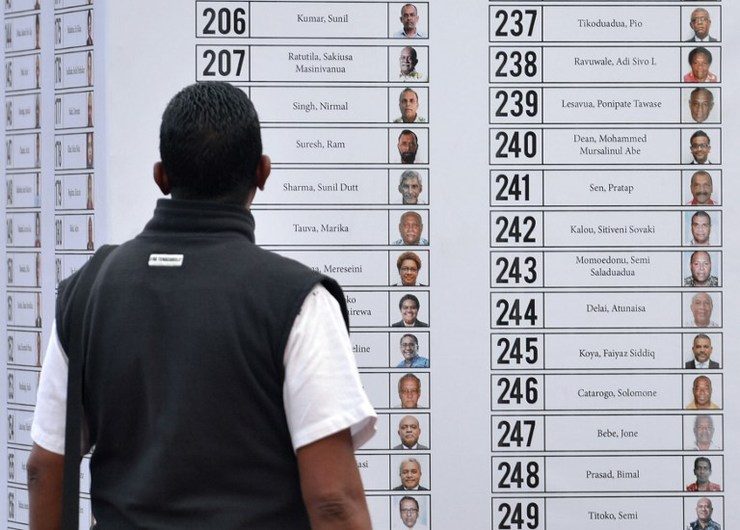SUMMARY
This is AI generated summarization, which may have errors. For context, always refer to the full article.

SUVA, Fiji – There was a mood of optimism tinged with apprehension at Suva’s eerily quiet central market Tuesday, September 16, ahead of the first election for eight years in Fiji – a South Pacific island nation with a history of coups.
As a handful of customers wandered the aisles, almost outnumbered by porters scurrying past with handcarts full of fruit, vegetables and spices, stallholder Rakesh Kumar said people were hunkering down to await the outcome.
“The election’s been bad for business,” he told Agence France-Presse. “Normally this would be very busy but people are scared to come into town because they don’t know what’s going to happen.”
Despite the impact on his bottom line, Kumar is an enthusiastic supporter of Fiji’s return to democracy after eight years of authoritarian rule under former military leader Voreqe Bainimarama, who is a leading candidate in Wednesday’s (September 17) poll.
“Progress,” Kumar declared when asked what the election would achieve. “We have to vote, it’s our right now. The people have to make a change.”
Fiji’s ballot is seen as pivotal to ending the country’s “coup culture”, which saw four governments toppled between 1987 and 2006, largely due to tensions between indigenous Fijians and ethnic Indians.
The Indians, descendants of laborers the British brought over to work in sugar plantations during the colonial era, comprise about 40% of the 900,000 population and have equal voting rights for the first time in this election.
Stallholder Devnil Kartik bursts with pride when he talks about casting a vote for the first time in his life, saying Fiji will benefit from a smooth transition to democracy.
“People are very passionate about it (voting),” he said. “If we have an election with no trouble then more people will come for tourism and the economy will go good.”
Yet for a country supposedly on the brink of ushering in a new era of democracy, Fijians remain nervous about discussing matters relating to the election.
Kartik and Kumar were the only people among more than a dozen canvassed by Agence France-Presse who were willing to speak on the record, even on apparently non-controversial matters.
More typical was the response from an indigenous Fijian fruit seller, whose broad smile dissolved when asked if he was looking forward to voting for the first time in 8 years.
“No politics thank you. Finished now,” was the polite but firm reply before he returned to expertly slicing and dicing pineapples with a small machete.
‘Suva will not burn’
When guaranteed anonymity, locals expressed two main fears – that the poll could descend into violence or that Bainimarama may not accept defeat.
A Suva-based student said he and his friends were stockpiling food and supplies in case trouble flared, citing rioting that broke out in the capital following a coup in 2000.
Bainimarama has vowed that will not happen, drafting in extra police and pledging “we will do everything required to keep the peace”.
“Suva will not be allowed to burn as it did in 2000 in one of the most disgraceful episodes in our nation’s history,” Bainimarama said last week. “You can be sure of it because we will make sure of it.”
Bainimarama has also promised to abide by the results of the ballot, even if he does not win.
It is a pledge one of the shoppers at the market on Tuesday, a University of the South Pacific academic who asked not to be identified, said the leader could find challenging.
“If he becomes prime minister he’s going to have a noisy, vocal opposition regardless of what happens,” he said.
“Is he going to put up with that? We’ll have to wait and see. He’s a military man. In the military you don’t question the commanding officer, in parliament, that’s exactly what you’re supposed to do.” – Rappler.com
Add a comment
How does this make you feel?
There are no comments yet. Add your comment to start the conversation.